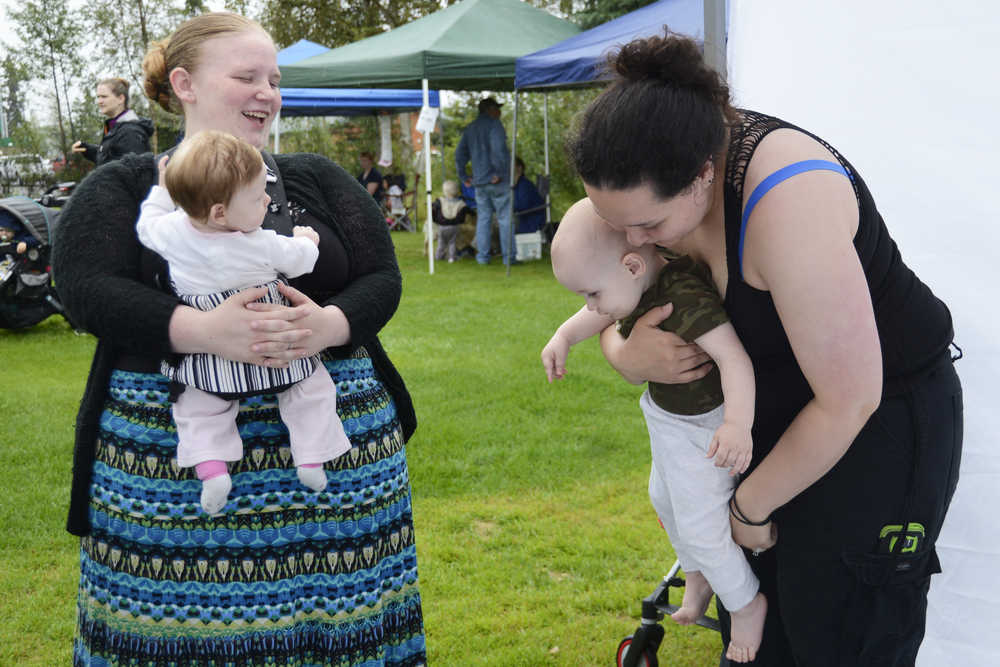Gloomy clouds and intermittent rain couldn’t dampen the spirits of a handful of parents gathered Saturday for their chance to contribute to the annual Big Latch On breastfeeding awareness event in Soldotna.
Huddled under tents while children darted from a small petting zoo to the playground at Farnsworth Park, some persistent moms stuck it out until 10:30 a.m. when they joined forces with women all over the world in an event to brings awareness to the importance of nursing.
“Honestly, this year’s probably the biggest one we’ve done,” said Samantha Van Vleet, one of the organizers. “We’ve done it since 2012 or 2011 … this is the first one I’m running and I think it’s going to be our biggest one yet.”
The global event first established in 2005 as part of World Breastfeeding Week seeks to fulfill one challenge — for every participating mom to have their child latch on and breastfeed for one minute at the exact same time. Last year, nearly 14,900 babies latched on simultaneously in 28 different countries, according to The Global Big Latch On website. Supporters joined nursing moms to make a total attendance of more than 36,500, according to the website.
The goal each year is to beat the previous year’s record, Van Vleet said.
“Anyone that comes, even if they’re not nursing, counts towards our totals for the year,” she said. “… And every location contributes, so even if we have just a couple more people show up it all adds up when it boils down to it.”
By bringing moms, families and supporters together for the coordinated feeding, the event helps raise awareness of the importance of breastfeeding and also promotes it within communities, Van Vleet said.
“We’re hoping it helps build community,” she said. “People can network, they can meet other nursing moms. They can see that nursing moms are supported in our community and are accepted, because there’s a lot of stigma around it — nursing in public — and so this is a great way to break that down.”
Van Vleet said she has personally experienced people being rude to her in public while she has been breastfeeding, so there is still a ways to go before the practice is completely accepted. The state of Alaska has had a statute protecting nursing moms since 1998. No municipality can “enact an ordinance that prohibits or restricts a woman breast-feeding a child in a public or private location where the woman and child are otherwise authorized to be,” the statute states.
Still, by holding an annual event that not only promotes but celebrates the act, more women are encouraged women to breastfeed in public, “which makes it more normalized,” Van Vleet said. Sponsored by the Central Peninsula Positive Birth Movement, this year’s event included several vendors with information and resources for mothers, food, live music and a petting zoo. One such vendor was Vanessa Perry, who moved to the area from Anchorage last year and has been working in behavioral health at Central Peninsula Hospital.
Perry was armed with evaluation forms and information about postpartum depression. She said that while it affects quite a few mothers nationally, about one in seven, it’s even more pervasive in Alaska where moms tend to be more isolated and at the mercy of seasonal affective disorder. The rate of postpartum depression in Alaska is about one in three or one in four, she said.
“For generations our moms and our grandmas went through postpartum depression or anxiety,” Perry said. “It was like, ‘Oh, you’ll get over it.’ And you do, anywhere from one to four years afterwards but in the meantime you’re miserable, (and it’s) sometimes prolonged.”
Perry, who said she noticed a gross lack of counseling services on the Kenai Peninsula specifically for maternal mental health, will transition to her own practice this coming spring, either in Kenai or Soldotna.
Also there to share her expertise and services was Juniper Lanmon-Freeman, a certified professional midwife who began providing at home-birth services in January after getting licensed in 2014. The demand for midwife services is great in the central Kenai Peninsula area — Lanmon-Freeman said she performs two to three births a month, and that the number is growing. Advising expectant mothers on whether to go with a midwife or give birth in a hospital is about listening to their needs and fears, she said.
“I would ask the mom, what kind of care is she looking for?” she said. “(With) midwives, it’s a little bit more personal, and we talk about nutrition. The doctors are personal also, but it’s very — it’s in your home, and it’s more of an intimate relationship.”

